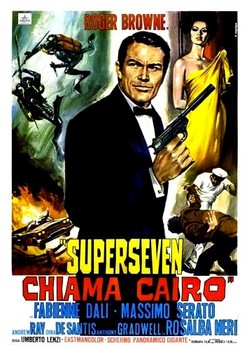This article has multiple issues. Please help improve it or discuss these issues on the talk page . (Learn how and when to remove these messages)
|
| Superseven chiama Cairo | |
|---|---|
 Film poster by Renato Casaro | |
| Directed by | Umberto Lenzi |
| Screenplay by | Umberto Lenzi Piero Pierotti |
| Based on | Superseven Calling Cairo by H. Humbert |
| Produced by | Fortunato Misiano |
| Starring | Roger Browne |
| Cinematography | Augusto Tiezzi |
| Edited by | Jolanda Benvenuti |
| Music by | Angelo Francesco Lavagnino |
Production companies | Romana Film Prodex Film |
| Distributed by | Romana Film |
Release date |
|
Running time | 95 minutes |
| Countries | Italy France |
| Language | Italian |
Super Seven Calling Cairo (Italian : Superseven chiama Cairo) is a 1965 Italian Eurospy film directed by Umberto Lenzi and adapted from his own novel of the same name written under the pseudonym "H. Humbert". It stars Roger Browne as the titular secret agent opposite Fabienne Dali, Massimo Serato, and Rosalba Neri. Shot mostly in Egypt, the film is heavily inspired by the early James Bond films starring Sean Connery. It is followed by The Spy Who Loved Flowers in which Browne reprises his role as Martin Stevens, and Lenzi returns to write and direct the film.